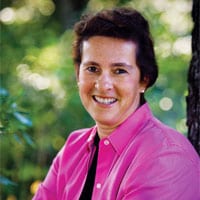To call her a pioneer is an understatement. At a time when more women are delaying childbearing for their careers, Alice “Ali” D. Domar, PhD, is helping us see you can’t always “have it all” without paying an emotional or physical toll – especially if you want to start a family.
As the founder and executive director of the first mind/body center for women’s health, and assistant professor of obstetrics, gynecology, and reproductive biology at Harvard Medical School, Ali is a research leader in women’s health, especially infertility. When Healthy Mom&Baby caught up with her, we asked about her center’s secret to success in achieving conception in women who have otherwise struggled with infertility.
When you founded the Domar Center for Mind/Body Health in 1987, you achieved high pregnancy rates with what others call your sixth sense of the emotional needs of women. What’s that about?
My parents struggled with both primary and secondary infertility. It took them 7 years to get pregnant with my sister and 5 years with me. I grew up hearing how hard that was on my mom; it seeped into who I wanted to become. When my mom was trying to conceive, she was prescribed the then equivalent of valium and got pregnant. I grew up knowing that I wouldn’t have had an older sister if my mom had not relaxed. We help women relax.
Your book, Be Happy Without Being Perfect: How to Break Free from the Perception Deception, deals with perfectionism. How do you get women to actually let go?
Bree (Marcia Cross) on Desperate Housewives is the epitome of what I’m trying to cure. If you’re tying to be perfect, you’ll be anxious all of the time. You’re putting way too much pressure on yourself and diminishing your self-esteem. My goal is to help women be physically and psychologically healthy.
Women typically just need permission. Just get more than one person to say “it’s ok” to let the stress and pressure go. The ones who have the most success agree to let go.
What exactly does that look like, especially when we’re struggling to balance a career and start a family?
Every morning when you’re jolted awake by a screaming alarm, spend 15-20 seconds thinking of one nice thing that you can do for yourself: buy flowers, call a friend, eat a good piece of fruit. Make the first thought a positive thought about you. I was in Los Angeles and woke up early one morning thanks to the time change. I realized, ‘Hey, there’s a farmers’ market down the street with fresh fruit, and it’s snowing in Boston. That’s a nice place I can take myself today.’ And I did.
Exactly how does stress jeopardize our fertility?
Wanting to have a child is a basic instinct. Difficulties conceiving change your outlook on everything from your work to how you see your partner and your closest relationships. By the time we see women for treatment, they’re already dealing with an array of emotions – these feelings affect their ability to conceive and their outlook on treatment.
The stress of infertility is comparable to that of serious illness. Women and couples who are struggling to conceive should seek treatment early – it makes them better prepared for their experiences, and it significantly lowers their stress as compared to those who go it alone.







Comments are closed.